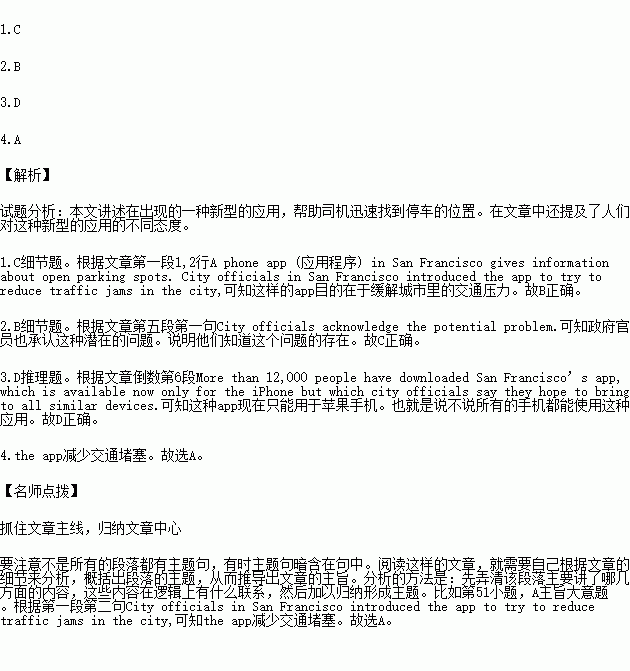题目内容
SAN FRANCISCO—A phone app(应用程序)in San Francisco gives information about open parking spots.City officials in San Francisco introduced the app to try to reduce traffic jams in the city, but some say it raises safety concerns.
In this city, drivers searching for parking spots lead to 30 percent of all downtown jams, city officials think.Now San Francisco has found a solution — a phone app for spot-seekers that shows information about areas with available spaces.The system, introduced last month, relies on wireless sensors(感应器)fixed in streets and city garages that can tell within seconds if a spot has opened up.
But the system could come with serious consequences.Some people say that drivers searching for parking could end up focusing on their phones, not the road.“It could be really distracting(使分心的),” said Daniel Simons, a professor of psychology at the University of Illinois.
City officials admitted the hidden problem.They are urging drivers to pull over before they use the city’s iPhone app, or to do so before they leave home. Nathaniel Ford, executive director of the San Francisco Municipal Transportation Agency, said safety could actually improve if drivers quickly found a spot instead of circling and getting frustrated.
San Francisco has put sensors into 7,000 parking spots and 12,250 spots in city garages.If spaces in an area open up, the sensors communicate wirelessly with computers that in turn make the information available to app users within a minute, said Mr. Ford, of the transportation agency.On the app, a map shows which blocks have lots of places(blue)and which are full(red).
More than 12,000 people have downloaded San Francisco’s app, which is available now only for the iPhone.
1.What is the phone app mentioned in the text mainly aimed at?
A. Benefiting iPhone users.
B. Preventing traffic accidents.
C. Making the traffic flow smoothly.
D.Making full use of the parking spots.
2.According to the text, San Francisco city officials ________.
A. don’t consider the app distracting.
B. are aware of the app’s disadvantages.
C. advise drivers to park cars slowly.
D. believe more parking spots are needed.
3.The phone app mentioned in the text ________.
A. is a bit slow in reacting
B. hasn’t been put into service
C. was introduced several years ago
D. can’t be downloaded to all phones
4.What’s the main idea of the passage?
A. A phone app has been introduced to relieve the pressure on traffic in the city.
B. Safety concerns are voiced about a phone app aimed at helping drivers find parking spots.
C. Looking for parking spots contributes greatly to downtown traffic jams.
D. Drivers’ attention is distracted in one way or another when they are driving.

